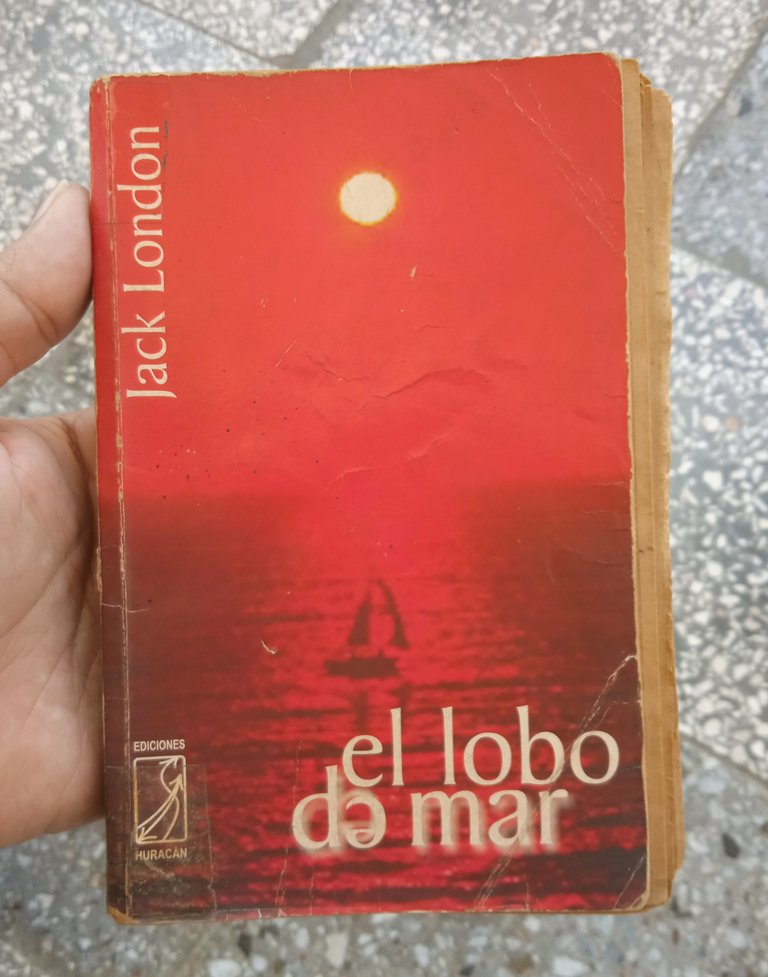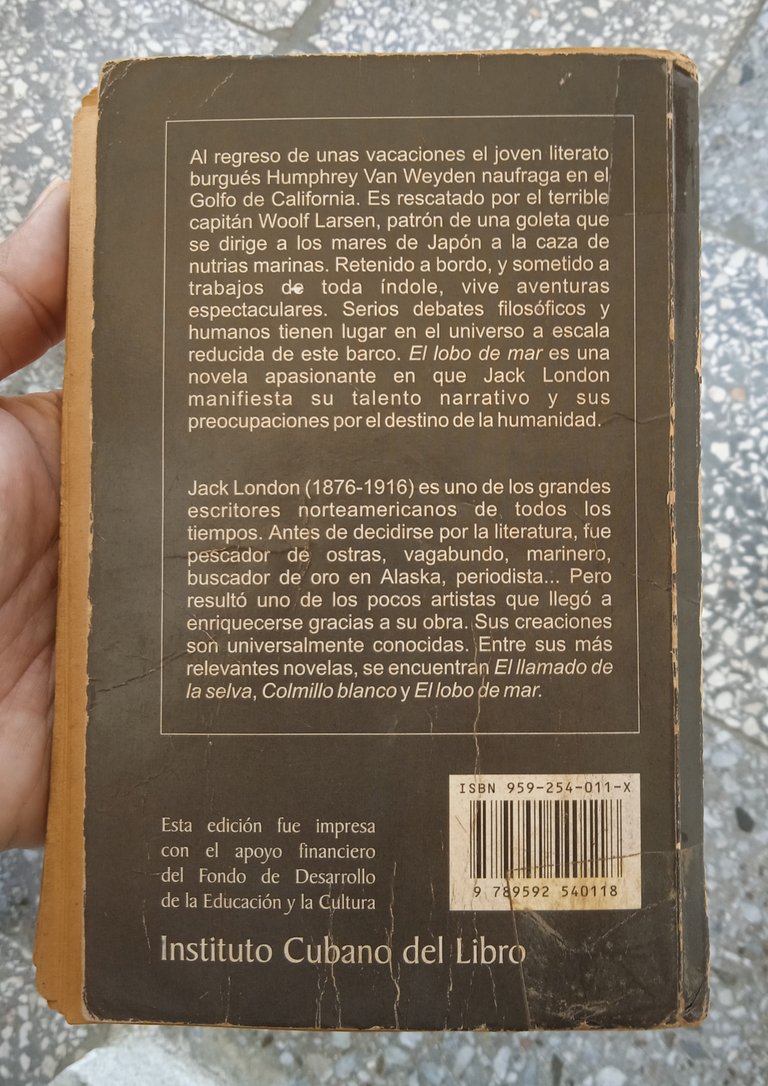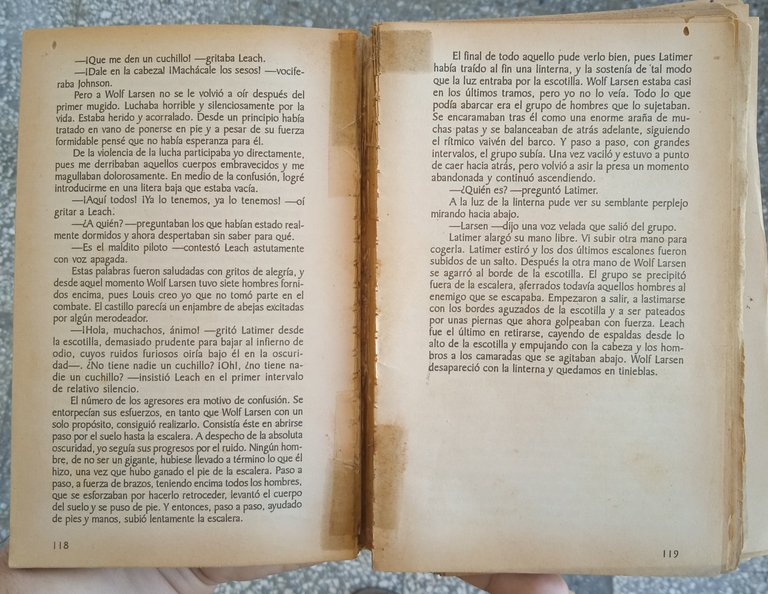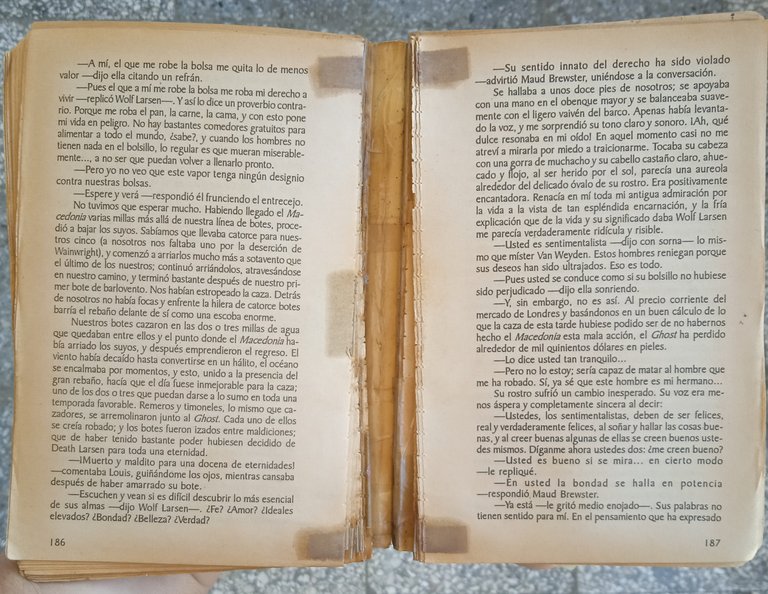Creciendo con El Lobo de Mar, de Jack London/ Growing up with The Sea-Wolf, by Jack London (ESP/ENG)
Navegando por el feed de #ecency encontré esta maravillosa comunidad y al instante me decidí a incorporarme, soy un gran amante de los libros y solo el tiempo me limita en este sentido. He visto varias comunidades sobre literatura, pero esta con su énfasis en las reseñas me resultó súper atractiva.
Para esta primera entrada y también presentación ante la comunidad, quiero hablar sobre un libro que marcó mi paso a la novela más o menos "adulta". El encuentro con "El lobo de mar", de Jack London, ocurrió cuando apenas contaba 12 años y fue todo un choque de trenes. Mis padres, que conocían otras novelas del autor de un corte juvenil quizás un poco más marcado, nunca supieron la potencia del texto que me regalaron.

El ejemplar que mis padres me obsequiaron y que aun conservo como un talismán.
Habrá quien piense que no es para tanto, que al final se trata de solo otro libro de aventuras, pero a los doce años fue toda una bomba. El libro se adentra con soltura en cuestiones filosóficas que en la época se me escapaban, pero que con las sucesivas relecturas fueron apareciendo en mi radar, complejizando la imagen.
Todo comienza con un naufragio y un rescate, y la negativa de devolver a puerto al náufrago. De ahí en adelante se hilan arbitrariedades y peripercias que el protagonista aparente (Humphrey Van Weyden, crítico literario) enfrenta a bordo de un barco conducido con mano de hierro por un villano protagónico y fascinante como un verdadero lobo (Wolf Larsen, capitán de barco).

La sencillez del exterior esconde a la perfección la tormenta interior.
La ética humanística en su mano a mano contra la ley del más fuerte, la ambigüedad de conceptos como la fuerza y la debilidad, crítica no tan velada de los sistemas morales y su tendencia a la hipocresía, crítica demoledora contra el darwinismo social... son solo algunos de los temas más profundamente abordados en esta narrativa que navega ágil como el barco en que toma lugar, el Ghost.
Todo ello bordado con un realismo crudo que solamente un conocedor de esa vida, como lo fue Jack London, puede mostrarnos hasta rozar el punto justo en que se insinúe en nosotros el rechazo. Sí, hay una cierta romantización de la violencia física, la suficiente como para cautivar adolescentes, pero hay también un realismo áspero y abrasivo que pone a pensar.

Hoy en mis manos es menos intimidante, pero a los doce años parecía no tener fin.
El protagonista crece como todo buen protagonista, pasando de apocado a sobreviviente, en una exploración dolorosa de su propia flexibilidad. El villano de cierta forma crece también, pero impulsado por los límites que su propia ¿villanía? le impone. Un contraste bien manejado que logra trascender con soltura la oposición simplista del bien y el mal, del ying y el yang, para ofrecernos un contraste humano a ratos filosófico y a ratos mezquino.
Este libro es una gran parábola, con el universo reducido a sólo un barco a la caza de pieles de focas, donde los conflictos reflejan los del mundo y su solución un tanto forzada refleja quizás la visión del autor... o las presiones editoriales, quién sabe.

El libro se me desmoronó en las manos, comenzando por las escenas épicas que de tanto releerlas partieron la espina.
El final cambia con la edad del lector. Para el adolescente es la consumación de la victoria esperada de un protagonista que supera con éxito sus tribulaciones. Para el adulto es una especie de interrupción, frenazo que evita el choque de trenes y nos priva de una resolución vívida y realista como el resto de la novela.
Ese es el gran defecto de este libro, tormenta que se anuncia desde el primer momento, panorama que se oscurece con presagios cada vez más fatídicos, hasta que el cielo de repente se abre y mediante una especie de deux ex machina todo cae en "su lugar". A lo mejor el autor tomó conciencia de sería el final el que decidiría la edad de su audiencia, o el editor quiso otro éxito de ventas, nunca lo sabré, pero puedo jugar a las asunciones.

Las marcas oscuras son de cuando intenté detener con cinta adhesiva el deterioro progresivo.
Este libro creció en mi mente con cada relectura a lo largo de los años, pues hoy cuento ya 35 y suman 23 de mutua compañía. Con el paso del tiempo y el mucho uso la edición de tapa blanda que poseo se fue desmoronando en mis manos, pero nunca he querido sustituirla: así, despedazada pero con todas sus hojas, sigue siendo mi talismán.
Yo crecí también con él y es precisamente ese mi mejor halago: 23 años después mantiene toda su relevancia, aunque hayan cambiado mis ángulos de apreciación y ataque.
ENGLISH VERSION
Browsing through the #ecency feed, I discovered this wonderful community and instantly decided to join. I'm an avid bookworm and time is my only constraint in this regard. I've seen several literature-focused communities, but this one, with its emphasis on reviews, struck me as particularly appealing.
For this first post and also as an introduction to the community, I want to talk about a book that marked my transition into more "adult" novels. My encounter with "The Sea-Wolf" by Jack London happened when I was just 12 years old, and it hit me like a freight train. My parents, familiar with some of the author’s more youth-oriented works, had no idea of the sheer intensity of the book they gifted me.

The copy my parents gave me, which I still keep as a talisman.
Some might argue it’s not that groundbreaking, just another adventure novel. But at 12, it was a revelation. The book delves into philosophical questions that initially flew over my head but gradually revealed themselves with each rereading, adding layers of complexity.
It begins with a shipwreck and a rescue, and the refusal to return the survivor to shore. From there unfolds a series of brutal trials faced by the apparent protagonist, Humphrey Van Weyden (a literary critic), aboard a ship ruled with an iron fist by a pivotal villain as captivating as a wolf himself (Wolf Larsen, the ship captain).

The simplicity of the exterior perfectly masks the storm within.
Humanistic ethics clashing with survival of the strongest, the ambiguity of strength and weakness, thinly veiled critiques of moral systems and their drift into hypocrisy, a scathing indictment of social Darwinism... these are just a few of the deep themes woven into the narrative, which sails as swiftly as the Ghost where it’s set.
All of this is stitched together with raw realism only someone like Jack London, who lived that life, could portray, walking the fine line where fascination teeters into discomfort. Yes, there’s a certain romanticization of physical violence (enough to captivate teenagers), but there’s also a gritty, abrasive realism that forces you to think.

Today, it feels less intimidating in my hands, but at 12, it seemed endless.
The protagonist grows, as all good protagonists do, from a timid intellectual to a hardened survivor, painfully testing the flexibility of his own limits. The villain, in his own way, grows too, constrained by the boundaries of his own... villainy? Their dynamic transcends simplistic binaries of good and evil or ying and yang, offering a contrast that’s at times philosophical and at times petty.
This book is a grand parable, compressing the universe into a single seal-hunting ship where conflicts mirror those of the wider world, and their resolution, somewhat forced, perhaps reflects the author’s vision... or editorial pressures. Who knows?

The book fell apart in my hands, starting with the epic scenes I reread so often the spine split.
The ending changes with the reader’s age. For the adolescent, it’s the triumphant victory of a protagonist overcoming his trials. For the adult, it feels like an abrupt interruption, a narrative brake that prevents the train collision and denies us the vivid, realistic resolution the rest of the novel promises.
That’s the book’s greatest flaw: a storm brewing from the first page, darkening with ever-more ominous foreshadowing... only for the sky to suddenly clear via a deus ex machina. Maybe the author realized the ending would define his audience’s age, or the publisher wanted another bestseller. I’ll never know, but I can speculate.

The dark stains are from my attempts to slow the decay with tape.
This book grew in my mind with every rereading over the years, I’m now 35, and we’ve been companions for 23 of them. The paperback edition I own has crumbled in my hands, but I’ve never wanted to replace it. Torn yet complete, it remains my talisman.
I too grew up with it, and that’s my highest praise: 23 years later, it retains all its relevance, even as my perspectives and critiques have shifted.
Este post es libre de IA.
📷 de mi propiedad.
This post is free of AI.
📷 are of my property.
Uno siempre de pequeño termina viviendo de más a través de libros como estos 😁. Es fascinante ver cómo la literatura marca nuestras vidas. Gracias por compartir 👏🏻.
Hay libros que marcan, y este es el caso. Cuando lo leí por primera vez, sólo alcance a ver la parte aventuresca, luego en el tiempo empecé a ver más, es casi como si el género de aventuras fuese en este caso la máscara necesaria para plasmar a cubierto las preocupaciones humanas del autor. Gracias por tus palabras y por llegarte hasta mis post.
I love your personal history with this book!

Among all other books by Jack London, this one stands taller in my own opinion, I find it way deeper, way harsher, way stormier, maybe it was one those books were the author's background thoughts flow into the page without he ever even noticing, maybe that's why he interrupted the plot with a storm.
In any case I can say this is a book that flows and shifts with the readers age. As a child I saw the wild adventures of a nice protagonist, as an adolescent I was led into questioning the value of morals, as an adult I finally saw the ever pressing need for a humane ethical system that enables us to propel one another in our personal searches.
As an additional and colorful detail, I began reading and rereading The Sea-Wolf before I could read comfortably in English, and that made a whole new adventure out of the book in its native language. That confirmed once more a personal suspicion: translation is approximation.
Thank you for your words and kind support, it is indeed much appreciated.
👏💪📕🫂✨
Dime tú (que tienes un tin mas de experiencia en el medio editorial) cuál piensas que sea la causa de ese final tan cuestionable, presiones editoriales o un caso muy serio de un autor cogiéndole miedo al rumbo de su obra.
¡Libro que a todos nos marcó en la infancia o adolescencia y resulta un tesoro incuestionable!
En Cuba los trabajos de Jack London reciben bastante atención al menos en su vertiente juvenil, es increíble comprobar cuántas personas han crecido marcadas por sus historias. Gracias por llegarte a mi post y por tus palabras.
¡Gracias a ti!
Oh my - I'm guessing your parents DID NOT READ this novel before gifting it to you!
I was just 12 years old, and it hit me like a freight train. My parents, familiar with some of the author’s more youth-oriented works, had no idea of the sheer intensity of the book they gifted me.
What a dark and nihilistic character, Wolf Larsen.
Intriguing.
“He was splendidly muscled, a heavy man, and though he strode with the certitude and directness of the physical man, there was nothing heavy about his stride. The jungle and the wilderness lurked in the uplift and downput of his feet. He was cat-footed, and lithe, and strong, always strong. I likened him to some great tiger, a beast of prowess and prey. He looked it, and the piercing glitter that arose at times in his eyes was the same piercing glitter I had observed in the eyes of caged leopards and other preying creatures of the wild.”
― Jack London, The Sea Wolf
"Life is cheap" - all those speeches!
“Do you know that the only value life has is what life puts upon itself? And it is of course over-estimated, since it is a necessity prejudiced in its own favor. ...There is plenty more life demanding to be born. ...He was worth nothing to the world. The supply is too large.”
I read the book in college, and it was hard not to believe the cynical captain had cornered the truth.
The romance between the shipwrecked writer and the "little woman" almost ruined the novel for me.
But... Wolf Larsen!
What a brutal and fascinating man.
Thanks for an interesting book review!
My parents only knew White Fang and The Call of the Wild, and from there they just assumed this was more of the same. The did not know better, and I never told them there was more to it than just an adventure book.
Now try to picture me, 12 years old, struggling with this passage:
"I believe life is like foam, like a ferment," he promptly replied. "A thing that has movement and can keep moving for a minute, an hour, a year or a hundred years, but in the end it will stop moving. The big one eats the small one to keep moving; the strong one eats the weak one to preserve its strength. The fortunate one eats the most and moves the longest, that’s all. What do you think of these things?"
Retrotranslation into English by myself, with all its likely problems and probable lack of similarity.
At that age, questioning the very value of life in such a way was indeed a bitter pill. But later, during adolescence, that bit would bloom into full blown cinicism that lasted quite a bit before fading away.
Thanks a lot for your words and fot stopping by my post.
LOVE IT
And that you read such classics at 12, and that you said nothing about the nature of this novel to your parents, who had no idea. :)